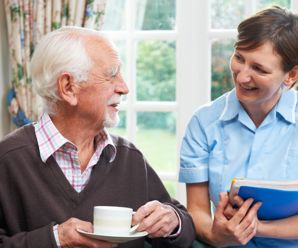
Examples of independent living skills
Here are five common examples of independent living skills:
Preparing healthy meals
Knowing how to prepare nutritious food at home is important to stay healthy and save money. Basic cooking skills like chopping food, heating food on the stove and using the oven can help individuals to follow simple recipes. Additionally, preparing a large batch of a dish in advance to eat throughout the week can save time.
Exercising regularly
Exercising can help individuals to gain fitness, build strength, and boost energy. By following a daily or weekly exercise routine, people can make exercise a part of their lives. There are many options for exercise, including going for a walk, taking a dance class, using a stationary bike or lifting weights.
Communicating effectively
Good communication skills are essential for individuals to explain their needs clearly and to learn about others’ needs. Communication allows individuals to earn trust and respect in order to build relationships. Talking to others is a way for individuals to fulfil their social needs which are an important aspect of overall wellbeing.
Home cleaning
Knowing how to clean and tidy their home is important not just for hygiene, but also to help people find their belongings, and create a more relaxing environment. This involves learning how to dust furniture, wipe kitchen counters, and vacuum floors. Further steps can include decluttering, organising possessions, and sorting clothes.
Managing finances
Individuals need to know how to track their personal spending to allow them to budget properly and understand where their money is going. For example, it is helpful to know how much they are spending on food, bills, rent, shopping and entertainment. Good financial management can help to save money for emergencies or major purchases.
Importance of independent living skills
Independent living skills allow individuals to live on their own and care for their health. They teach people to be self-sufficient, reducing their reliance on others and giving them a sense of confidence and purpose. Independent living skills also help people to establish a daily routine that provides balance to their lives.
There are many benefits of having independent living skills including:
- Developing critical thinking: Living independently means facing challenges and solving problems alone. By not being completely dependent on others’ people naturally form their own opinions and viewpoints, and learn to think for themselves.
- Boosting self-confidence: Independence teaches people to trust their own decisions and judgements and not be reliant on the opinions of others. This will give them a more positive self-image and enhance their confidence.
- Practising life skills: Knowing how to care for themselves, to be able to wash, cook and clean, are important for improving an individual’s quality of life. This can improve concentration, reduce stress and increase overall happiness.

Independent living skills by category
Independent living skills for teens
Teens are looking to take control of their lives and become more independent. This can be especially challenging if they have severe learning and thinking difficulties. It’s often not just a matter of knowing how to handle day-to-day tasks, but also having the emotional maturity to face life on their own.
Independent living skills for teens include:
- Personal care: Practising good personal hygiene like taking showers and brushing teeth. Taking part in physical exercise from playing team sports to taking a walk.
- Socialising: Meeting strangers, holding conversations, and making new friends. Having the confidence to join local groups and activities and interact with other people.
- Managing money: Budgeting for living expenses like rent, bills, food, personal items, and recreational activities. Setting spending limits to avoid debt.
- Food preparation: Storing and preparing food safely. Knowing which foods can and can’t be stored for long periods of time. Cooking simple meals.
- Shopping: Making purchases for essential items. Knowing which stores stock which items. Knowing how to interact with store staff.
Independent living skills for young adults
Young adults are looking to explore who they are and find their own identity. They have the freedom to make their own life choices for the first time. The greatest struggle young adults face is finding meaning and purpose in their lives.
Independent living skills for young adults include:
- Personal appearance: Dressing smartly in clean clothes, having proper personal hygiene, good grooming and confident body language.
- Exercise and fitness: Having a regular exercise routine to develop fitness, whether it's playing sports, weight training or running.
- Health: Understanding how to recognise and manage common health problems like colds and the flu. Knowing when to see a doctor.
- Home maintenance: Cleaning and organising a living space. Doing the laundry, washing dishes and vacuuming the floors.
- Accessing community resources: Being able to access and use local resources like the supermarket, bank, and GP surgery.
Independent living skills for adults
Adults have established their identity and have more experience in being responsible, self-disciplined and purposeful. They are used to personal autonomy and the freedom to make their own decisions. Adults have a strong sense of how they fit in society and where they belong.
Independent living skills for adults include:
- Following a healthy diet: Plan and prepare meals which are well-balanced and nutritious. Preparing home-cooked meals with appropriate equipment.
- Dressing and undressing: Being able to dress and undress unassisted, with specialist equipment or adapted clothing where necessary.
- Mental health care: Knowing how to access support for mental health conditions such as stress, anxiety and depression.
- Home safety: Understanding how to prevent falls with good lighting and secure flooring. Using personal alarms and alerts to stay safe.
- Avoiding scams: Knowing how to recognise common scams. Following safe practices such as confirming identities and not clicking on unverified links.
Independent living skills for individuals with disabilities
Individuals with disabilities face multiple challenges regarding independent living. This can include stereotyping and stigma, communication hurdles due to physical or cognitive impairments, and difficulties in accessing community services. These are challenges that need to be addressed for a disabled individual to reach their full potential.
Independent living skills for individuals with disabilities include:
- Personal hygiene: Regular habits like brushing teeth twice a day, washing hands regularly and bathing daily protects from germs that can cause illness.
- Meal preparation: Simple adaptations such as having straws for those who struggle to eat solid food can greatly improve access to proper nutrition.
- Time management: Being able to organise their time allows people to have structure and freedom from rigid societal expectations.
- Social networking: Knowing how to make friends despite the possible impediments of having to use adaptive equipment.
- Budgeting: Being able to manage personal finances despite sensory, physical or cognitive limitations.
Independent living skills for adults with mental illness
Individuals with mental illness often face stigma, prejudice and discrimination due to ignorance or lack of understanding. They may be reluctant to seek help which can lead to social isolation, making it harder to access the support and services they need.
Independent living skills for adults with mental illness include:
- Personal care: Taking classes on healthy eating, hygiene, dressing, grooming, coping skills, and money management.
- Social interaction: Effective communication, empathy, decision-making, problem-solving, critical thinking.
- Leisure activities: Structuring leisure time, finding and participating in leisure activities, knowing how to relax and have fun.
- Relationship building: Forming fulfilling relationships, positively impacting the lives of others, and finding a sense of belonging.
- Community integration: Knowing how to access community resources including education, housing, and healthcare.
Independent living skills for autistic adults
Individuals with autism can find everyday conversation difficult. They may struggle to understand body language, facial expressions or gestures. Consequently, they may become anxious and withdrawn, making it hard to engage with people in order to lead a full and active life.
Independent living skills for autistic adults include:
- Home safety: Knowing what to do if there is a fire. Reducing the risk of crime. How to contact fire, police, and medical services.
- Self-advocacy: Having the confidence and ability to express personal preferences. Dealing with landlords, neighbours and service providers.
- Transportation: Able to drive or use public transportation. Access free community transportation where offered.
- Financial literacy: Managing a personal budget, savings accounts and insurance policies. Recognising and avoiding financial scams.
- Relationships: Being able to make friends and maintain stable relationships. Knowing what to do if someone is trying to take advantage.
Independent living skills for adults with learning disabilities
Individuals with learning disabilities may face social challenges including isolation and discrimination. The reasons are often rooted in societal misconceptions, lack of empathy for their condition, and communication issues. They may find it hard to engage in social activities and build relationships.
Independent living skills for adults with learning disabilities include:
- Cooking and baking: Knowing how to prepare food that is nutritious and safe to eat. Practising good hygiene in the kitchen.
- Cleaning: Washing dishes, doing the laundry, cleaning the bathroom, using the vacuum cleaner, and taking out the rubbish.
- Self-care: Bathing and showering, toilet hygiene, grooming, dressing, health maintenance, and brushing teeth.
- Personal organisation: Making lists, setting realistic goals, time management, prioritising important tasks and attention to detail.
- Household chores: Vacuuming and sweeping floors, washing up, cleaning kitchen worktops, and decluttering living spaces.
Independent living skills for care leavers
Individuals leaving care may be contending with multiple challenges. These might include emotional and mental health problems stemming from a history of abuse or neglect. They must also learn to adjust to living alone without the support system they had in care.
Independent living skills for care leavers include:
- Personal skills: Talking to a wide range of people with confidence. Showing empathy for others. Successfully facing and resolving conflicts.
- Learning: Acquiring new skills, developing interests and keeping the mind active. Knowing how to access local resources for learning.
- Money management: Paying for housing costs and bills. Knowing how to budget and track spending. Saving and setting financial goals.
- Personal health: Having the knowledge, ability and confidence to take an active role in their health. Understanding the importance of proper diet and exercise.
- Personal well-being: Managing emotions and being able to deal with stress. Knowing how to access support systems when help is needed.

Independent living skills checklist
An independent living skills checklist helps individuals to work out what they can do already and what they might wish to learn more about. Even when people feel they have an area of their life covered, working through a checklist may allow them to discover new skills to learn.
Download your free independent living skills checklist or contact us to discover how we can help you further.
Here is a simplified version of the independent living skills checklist.
Personal finances
- Do you know how to open a bank account and check bank statements?
- Do you understand how credit cards work and their fees?
- Do you know how to use ATMs, card readers, internet and telephone banking?
- Do you understand the consequences of not paying utility bills?
- Do you know how to contact a service provider to negotiate a repayment plan?
Housing
- Do you understand the different housing options available?
- Do you know where to look for housing?
- Do you know how to complete a tenancy agreement?
- Do you know who to contact if you have a problem with the landlord?
- Do you know where to apply for housing assistance?
Health and wellbeing
- Do you understand the differences between healthy and unhealthy food?
- Do you practice good personal hygiene?
- Do you know where to get help with health issues?
- Do you know how to contact emergency services?
- Do you know how to keep your home secure from intruders?
Daily living
- Do you know how to care for and wash clothes?
- Do you know how to plan a weekly shopping list?
- Do you know how to cook a meal following a recipe?
- Do you know how to clean your home and keep it tidy?
- Do you know how to pay utility bills?
Social development
- Do you know how to greet someone and introduce yourself?
- Do you know how to hold a conversation and maintain eye contact?
- Do you know how to manage conflict while staying calm?
- Do you know how to say ‘no’ to suggestions you’re not comfortable with?
- Do you know how to find and take part in social activities?
This checklist can also be used to carry out an assessment of independent living skills.
Download your full version of the independent living skills checklist, or contact us to speak to one of our experts.
Independent living skills activities
Independent living skills activities help individuals gain the ability and confidence to lead happy and fulfilled lives while living alone. These activities can include:
- Assistance with budgeting and personal finance.
- Classes in cooking, baking and food preparation.
- Lessons in home maintenance.
- Support with going out in the community and making friends.
- Day trips to the supermarket, coffee shops and leisure centres.
Domiciliary care software solutions
Quality domiciliary care empowers individuals to develop and maintain independent living skills, allowing them to enjoy greater choice and control over their lives.
At Access, we have been supplying software solutions to the care industry for over 30 years. We currently support over 11,000 registered care locations in the UK.
Our comprehensive suite of home care management software gathers all the domiciliary care solutions you need in one place. This enables you to improve efficiencies and reduce administration time, so you can spend more time focused on delivering quality care.
We have a wide range of options including;
- EMAR (electronic medication administration record)
- Electronic care plans
- Scheduling and home care management
- Auditing and quality management
- Care training and eLearning
- Accurate policies and procedures
To find out more about the home care management software we offer at Access, contact us here to discuss your needs or book a demo.

 AU & NZ
AU & NZ
 SG
SG
 MY
MY
 US
US
 IE
IE

